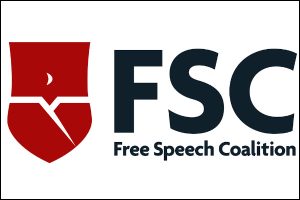FSC Sues to Block Indiana’s New Age-Verification Law
 The Free Speech Coalition (FSC) announced Monday that the organization, along with a group of adult platforms, has “filed a legal challenge in Indiana over the state’s age-verification law, SB17, arguing that it violates the First Amendment of the U.S. Constitution.”
The Free Speech Coalition (FSC) announced Monday that the organization, along with a group of adult platforms, has “filed a legal challenge in Indiana over the state’s age-verification law, SB17, arguing that it violates the First Amendment of the U.S. Constitution.”
According to the announcement, SB17 “empowers the state attorney general to file civil suits against platforms with adult content if they do not require visitors to upload a government ID and scan their face, or otherwise verify their age and identity.” The new Indiana law is scheduled to go into effect on July 1 of this year.
The FSC noted that in “addition to challenging the merits of the law, the Free Speech Coalition and its co-plaintiffs have requested an expedited preliminary injunction in the United States District Court Southern District of Indiana.”
“We will continue to fight for the rights of adults to access the internet free of shame and surveillance,” said FSC Executive Director Alison Boden. “While they may sound reasonable on their face, laws like SB17 have effectively functioned as state censorship. These laws have been a failure on every front, and we must take action to protect both the consumers and producers of expressive works from this harmful government overreach.”
FSC has challenged similar laws in Louisiana, Texas, Utah and Montana, and has filed a petition for a writ of certiorari with the United States Supreme Court.
Joining Free Speech Coalition as co-plaintiffs in the lawsuit are an array of adult platforms and content producers, including Aylo Premium LTD; Aylo Freesites LTD; Webgroup Czech Republic, A.S.; NKL Associates, SRO; Sonesta Technologies, S.R.O., Sonesta Media, S.R.O.; Paper Street Media, LLC; Neptune Media, LLC; Mediame, SRL; Midus Holdings, Inc.
In the complaint, FSC asserts that SB 17 “violates the First Amendment in two fundamental ways.”
“First, the Act’s age verification requirement is a content- and speaker-based restriction that fails strict scrutiny,” FSC asserts in the complaint. “Despite impinging on the rights of adults to access protected speech, it fails strict scrutiny by employing the least effective and yet also the most restrictive means of accomplishing Indiana’s stated purpose of allegedly protecting minors. Indeed, minors can use proxy servers, virtual private networks (“VPNs”), the “Tor” browser, and numerous other circumventions to bypass the Act’s verification requirements with ease; the law excludes search engines and most social media sites even though they pose a greater risk of exposure to adult content; and protected speech will be chilled as adults refuse to risk exposing their personal information that could lead to financial or reputational harm. In contrast, content filtering at the browser and/or the device level allows anyone wishing to implement that technology on minors’ devices to block access to any unwanted site, including adult sites, without impairing free speech rights or privacy. But such far more effective and far less restrictive means don’t really matter to Indiana, whose true aim is not to protect minors but to squelch constitutionally protected free speech that the State disfavors.”
FSC also argues that “under the heightened scrutiny required by the First Amendment, the Act is incurably vague as to its fundamental requirements, providing neither a coherent standard for assessing to which websites it applies, nor adequate guidance on what ‘age verification’ entails.”
You can read the full complaint here. On the FSC website, you can also read the motion for expedited preliminary injunction and the brief in support of the motion.













